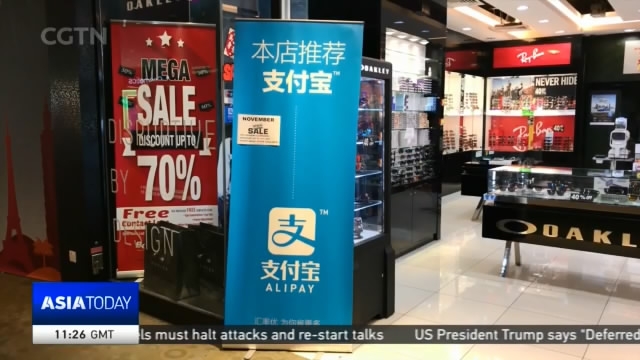
20:02, 15-Jan-2018
ASEAN E-Payments: WeChat Pay, Alipay compete in Malaysia

Looking at mobile payments in Malaysia now. WeChat Pay and Alipay are both seeking new customers in Malaysia with the ultimate aim of acquiring a hefty chunk of the ASEAN market of more than 600 million people. Rian Maelzer reports from Kuala Lumpur.
Chinese tourists flock to this fruit stall to enjoy the pungent flesh of the durian. And, this merchant has made it that much easier for Chinese visitors by accepting payments via Alipay.
PANG YOK MIN FRUIT SELLER "It has boosted my business, it has definitely increased and is more convenient. It's easier for both me and my customers. Just use the mobile phone to scan and everything is done. The Chinese tourists are really happy. They are surprised to find they can use Alipay here."
Alipay has been operating in Malaysia since mid-2017, but so far only for the use of Chinese tourists. Alibaba's rival Tencent, meanwhile, has got the green light to launch WeChat Pay here to cater to locals. Its first foray outside the Chinese mainland and Hong Kong.
QUAH MEI LEE, ANALYST FROST & SULLIVAN "The key drivers are in place in Malaysia. There's local government pushing towards cashless payments, and there's also a common payment method in the hands of all Malaysians in the form of a debit card. In terms of use potential, WeChat does have a sizeable number of WeChat users that they can tap on as a readily convertible base."
RIAN MAELZER KUALA LUMPUR "Malaysia's central bank is undertaking reforms to spur cashless payments. That includes allowing companies to do controlled testing of their products in the marketplace while they are still going through the lengthy approvals process."
Alibaba affiliate Ant Financial has a deal with Malaysia's toll, parking and transit payment card operator Touch n Go to launch an e-wallet system for locals. And while both Alibaba and Tencent are keen to expand across the ASEAN region, it won't be easy to replicate the success the two giants have achieved in China.
QUAH MEI LEE, ANALYST FROST & SULLIVAN "In the Asia Pacific, the payments landscape is very localized and fragmented. In order for a solution to work regionally it has to be able to address local user behaviour and considerations."
Fruitseller Pang, for one, doesnt' need convincing of the benefits of cashless mobile payments and says he spreading the word among his merchant friends. Rian Maelzer, CGTN, Kuala Lumpur.

SITEMAP
Copyright © 2018 CGTN. Beijing ICP prepared NO.16065310-3
Copyright © 2018 CGTN. Beijing ICP prepared NO.16065310-3